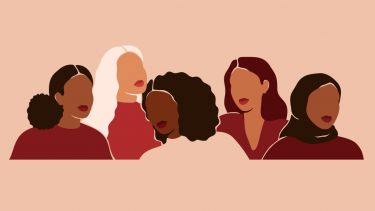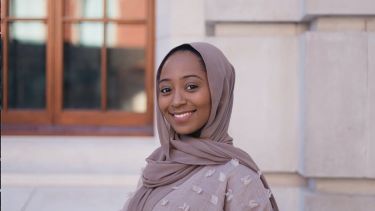Misogynoir #2 - The Black Woman’s Experience
In my last blog, I talked about intersectionality and Misogynoir and the future of feminism. In this blog, I want to talk about religion and beauty standards. Two topics that are often not spoken about in length when exploring the black woman’s experience, a fact that needs rectifying.
My home is the central intersection in a Venn diagram of oppression.
Rafia Rafiq
Not Just a Black, Muslim Woman
Black Muslim Women
Being a black woman means dealing with the world in a myriad of different ways. The lens of being black, a woman and whatever other identities one upholds all contribute to the ways in which we are treated and interact with the wider world. As a Catholic woman, religion has played a significant role in my upbringing and life. I attended Catholic schools, went to church, and believe in God. However, my religion does not make me feel as though I am at odds with other communities. As an African, Christianity is one of the biggest religions of our race and many African countries identify as Christian or Catholic. My religion is not something that makes me feel as though I do not fit into the black community, nor does it segregate me in Western countries as it is considered a eurocentric religion. My religion not impeding my ability to integrate with the wider black community means that I recognise my need to be more aware of the experiences of women whose religious backgrounds do lead to ostracisation and otherness. In her essay ‘Not Just a Black, Muslim Woman,’ Raifa Rafiq writes a compelling and incredibly insightful account of her experience as a Black Muslim Woman. She describes her school days, in which she struggled between her identity as a black girl and her religious difference from her peers. Rafiq’s account is an important insight into how the black experience is not universal, nor does the black community always provide comfort for those with different circumstances.
In her essay, Rafiq identifies that to be a Black Muslim Woman is to be someone ‘who can call home many places, but equally not sit comfortably anywhere.’ The idea that having many identities does not necessarily mean that you find comfort or belonging in each of those identities, but rather, it means there are more communities to be rejected or ostracised from. As human beings, we are social and thrive in a community. It would be assumed that the more communities you fit into, the more secure you would feel in society, but the inverse is often the case. When your multiple identities all make you vulnerable to marginalisation and oppression, it often drives many to identify with the one that is the most comforting in the circumstance. Rafiq recalls that she ‘chose to be black at school and Muslim at home,’ due to the fact that masking her religion in school allowed her to relate to the black students at her school - ‘here was a fragment of me I was never able to share.’ Rafiq also talks about her status as a black woman in Islam, and how the black community are often ostracised and othered by the wider Muslim community due to their race and her inability to fully integrate with all Muslim communities due to racism. Reading Rafiq’s essay stirred many emotions in me, as an immigrant black woman who comes from a lower socioeconomic background, I have often felt as though I did not fully belong in the spaces occupied. Belonging while identifying as many different labels can make you incredibly lonely. You never fully feel as though you fully belong, no matter how much you try to force yourself to identify with the identity you have in common with the majority. One of the lines that stood out to me the most in Rafiq’s essay was her quote on belonging. It fully encapsulated how I felt about belonging and feeling stable in my environment.
Belonging is like a trampoline. It is having the awareness that no matter how high you jump, how many risks you take, there is a place down there that will absorb the force of your fall should you ever come crashing down.
Rafia Rafiq
Not Just a Black, Muslim Woman
Featurism, Texturism, Colourism: A lot of 'isms'
Beauty standards suck. Beauty standards that exclude your race suck. But beauty standards that exist within our race community and STILL exclude you? Now that just does not feel fair.
The terms featurism, texturism, and colourism might not be familiar to those outside the black community, and for those within the black community that are familiar with those terms, I can audibly hear the tuts of disgruntled disgust already. The terms I have used are terms that describe the discrimination black people experience based on their prominent African features, hair texture and darker pigmentation. These are discriminations that are experienced not only in the wider world but also within one’s own community and at times, homes. As a result of colonisation and internalised adhesion to systemic racism, those with prominent African features, tight coily hair and darker skin are often excluded from what many consider beautiful.
The black standard of beauty tends to be light-skinned, with loose curls and eurocentric features. A woman must have the body of a black woman but the face of a European woman. Otherwise, her femininity and beauty are brought into question and scrutinised. Black women who do not adhere to this beauty standard are often masculinised and stripped of their femininity; this happened to tennis star Serena Williams, who endured years upon years of masculinisation from the black community due to her African feature and athletic build. Once a woman does not fit within the standard set to her, she is denied her femininity or respect. To think that the features that are so closely linked to being black are the features that we are taught to hate is something that I had to grapple with for a long time, it is still something I grapple with. But the thing that breaks my heart the most is the fact that black little girls arent safe from this standard either. When Beyonce’s baby Blue Ivy was born, the internet was flooded with comments about how dark her skin was, her natural type 4 hair, her features and everything a little girl should not have to deal with months after being born! Colonialism has done significant damage to the black community and the treatment of black women is proof. Michelle Obama had to deal with years of media masculinisation because of her features. As Black women, we not only face marginalisation from the wider world but also within our own communities. It is exhausting and it is draining. Women like Lupita Myong'o, Adut Akech, Nyadak "Duckie" Thot, Issa Rae, Ravin Goodwin and Michaela Coel were some of the first women I saw myself in: successful, beautiful darker-skinned women with immense amounts of talent and natural hair. While I love Zendaya, Yara Shahidi and Beyoncé, it is the aforementioned women that give me comfort.
Written by Valentia Adarkwa-Afari, Digital Student Ambassador, on 18 April 2022.

International undergraduate scholarships
We are offering scholarships of £2,500 for each year (subject to a 60% average) of your undergraduate degree. The maximum value is £10,000 for four-year programmes.


